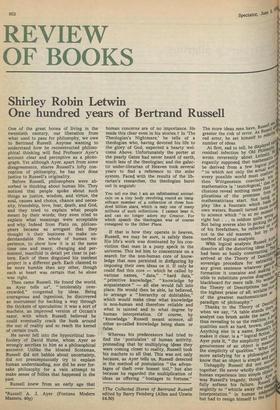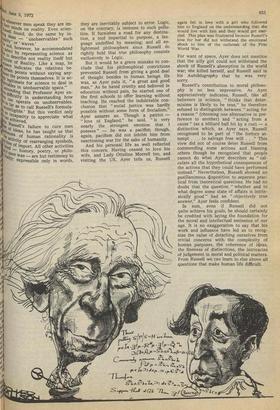Shirley Robin Letwin One hundred years of Bertrand Russell
One of the great boons of living in the twentieth century, our liberation from what used to pass for philosophy, we owe to Bertrand Russell. Anyone wanting to understand how he reconstructed philosophical thinking will find Professor Ayer's account clear and perceptive as a photograph. Yet although Ayer, apart from some disagreements, shares Russell's lofty conception of philosophy, he has not done justice to Russell's originality.
Before Russell, philosophers were absorbed in thinking about human life. They noticed that people spoke about such things as justice, wisdom, and virtue, the soul, causes and choice, chance and necessity, friendship, love, fear, death, and God, and they tried to explain what people meant by their words; they even tried to explain what meanings were acceptable and why. Indeed from Plato on, philosophers became so arrogant that they thought it their business to make understandable the whole of human experience, to show how it is at the same time one and many, changing and permanent, manifold in detail yet clear in pattern. Each of them disguised his insolent project in a different garb. Each claimed, to be more humble than any other, though each at heart was certain that he alone was right.
Then came Russell. He found the world, as Ayer tells us`, intolerably over crowded," congested by ideas. Being courageous and ingenious, he discovered an instrument for hacking a way through the thickets of speculation: it was a sort of machete, an improved version of Occam's razor, with which Russell believed he could eventually crack the husk around the nut of reality and so reach the kernel of certain truth.
He never fell into the hypocritical tomfoolery of David Hume, whom Ayer so wrongly ascribes to him as a philosophical ancestor. Unlike the bloated Scotsman, Russell did not babble about uncertainty, did not presumptuously try to explain human understanding, nor did he ever forsake philosophy for a vain attempt to make sense of follies that happened in the past.
Russell knew from an early age that human concerns are of no importance. He made this clear even in his stories.t In 'The Theologian's Nightmare,' he tells of a theologian who, having devoted his life to the glory of God, expected a hearty welcome Above. Unfortunately the porter at the pearly Gates had never heard of earth, much less of the theologian; and the galactic under-librarian of Heaven took several years to find a reference to the solar system. Faced with the results of the librarian's researches, the theologian burst out in anguish:
You tell me that I am an infinitesimal animalcule on a tiny body revolving round an insignificant member of a collection of three hundred billion stars, which is only one of many millions of such collections. I cannot bear it, and can no longer adore my Creator. For which speech the theologian was of course consigned to the Other Place.
If that is how they operate in heaven, Russell, we may be sure, is safely there. His life's weirk was dominated by his conviction that man is a puny speck in the universe. This led him to concentrate on a search for the non-human core of knowledge that men persisted in disfiguring by imposing their own ideas on it. If only he could find this core — which he called by various names, "data," "hard data," "primitive knowledge," "knowledge by acquaintance" all else would fall into place. He would then be able, he believed, to arrange a "hierarchy of dubitables," which would make clear what knowledge is non-human and therefore reliable and what is tainted and to what degree by human interpretation, Of course, by ' knowledge ' Russell meant science, all other so-called knowledge being sham or false.
Whereas his predecessors had tried to find the 'postulates' of human activity, pretending that by multiplying ideas they were coming closer to reality, Russell took his machete to all that. This was not only because, as Ayer tells us, Russell detected in the method of postulation "the advantages of theft over honest toil," but also because he regarded the multiplication of ideas as offering "hostages to fortune." 40 The more ideas men have, Russeii,', greater the risk of error. As Russe",a red error, he set himself to red° number of ideas. A Sig At first, sad to tell, he displaYeu residual infection by Old Pilil°s°P wrote reverently about Leibnitz; rogantly supposed that matheraat'clic, be derived from a few logical prIcid " to which not only the actual °. every possible world must confr,0; then Wittgenstein convinced 'Lip mathematics is ` tautological,' that tile elusions reveal nothing more dnin $1/ plications of the premises f0100 mathematicians start. Not being„ play 'like a fountain which leen' own waters, Russell turned More prantil to science which "is at no ni . nniv.'a to science which "is at no ni . right but . . is seldom quite igroic7t But being averse also to pickill.g; of his forefathers, he refiecten not in the old manner, but bY logical analysis R With iassell "11)P111 method of logical analysis. dissolve all the distorting ideas tha11:11 had been so busily constructing', tio0 arrived at the Theory of Descneo sovereign procedure for extracto any given sentence whatever el iø d formation it contains and 111316%0°1r sible to substitute precise diagra.":det blackboard for mere talk. No 0)Pree0 the Theory of Descriptions basfrC the highest praise of all, acclaiin of the greatest mathematicians paradigm of philosophy." Thanks to the Theory of Vesc-,, when we say, "A table stands ther,cii, analyst can brush aside the nagle,,' thus revealing to us the realities, " obl°11°0 qualities such as hard, brown, Anything else in a name, Russell's„ or, makes it clear, is a "logical fictiorl'olL Ayer puts it, "the simplicity and !tired, genuineness of an object is ine,!;,00 the simplicity of qualities." "010 more satisfying for a philos0Plle,:ge0 know that an object is sirnPie all';"ceed, Unhappily Russell did not together. He never wholly disinteg, , human experience into simple oble'el. was Russell's tragedy, though Mi ' 6t fully softens his failure. Russit.fle mightily to "whittle away thecwinterpretation " in human unrs but had to resign himself to the Whenever men speak they are imthei hssertirrunds on reality. Even scienqg , found, do the same by in klscitivde,as unobservables ' such 'he °r waves. di1C1, however, he accommodated lect by representing science as tO describe not reality itself but kieethre of Reality. Like a map, he 0:1ce indicates the relations beabotlt–'1 Points without saying any Ily Points themselves. It s ac egiti i mate for science to deal in '. rvableg • 'hst„„ in unobservable space." esding that Professor Ayer ex'41meulty in understanding how socan operate on unobservables. ilnintfr. as to call Russell's formulaBut this verdict only incapacity to appreciate what ts achieved. 4 Iltissell's failure to cure men toth Of ideas, he has taught us that the es Of human rationality is . 3aCtIVity of rearranging symbols, rahltd`e of import. All other activities ksit " history, poetry, or philofr ,°11Ce Was — are but testimony to alltY: expressible only in words, they are inevitably subject to error. Logic, on the contrary, is immune to such pollution. It furnishes a road for any destination, a tool impartial to purpose, a language undefiled by meaning; and all enlightened philosophers since Russell do rightly hold that true philosophy consists exclusively in Logic.
But it would be a grave mistake to conclude that his philosophical convictions prevented Russell from giving a good deal of thought besides to human beings. He was, as Ayer puts it, "a great and good man." As he hated cruelty and believed in education without pain, he started one of the first schools to offer learning without teaching. He reached the indubitable conclusion that " social justice was hardly possible without some form of Socialism," Ayer assures us. Though a patriot — "love of England," he said, "is very nearly the strongest emotion that I possess" — he was a pacifist; though, again, pacifism did not inhibit him from sanctioning war for the sake of humanity. And his personal life as well reflected this concern. Having ceased to love his wife, and Lady Ottoline Morrell too, and visiting the US, Ayer tells us, Russell again fell in love with a girl who followed him to England on the understanding that she would live with him and they would get married. This plan was frustrated because Russell's love for her did not withstand the emotional shock to him of the outbreak of the First World War.
For want of space, Ayer does not mention that the silly girl could not withstand the shock of Russell's absorption in the world war; she killed herself, and Russell said in his Autobiography that he was very sorry.
Russell's contribution to moral philosophy is no less impressive. As Ayer appreciatively indicates, Russell, like all believers in science, "thinks that determinism is likely to be true," he therefore refused to distinguish between "acting for a reason" (choosing one alternative in preference to another) and " acting from a cause "(as a billiard ball hit by a cue) — a distinction which, as Ayer says, Russell recognised to be part of "the forlorn attempt . . . to salvage free will . . ." This view did not of course deter Russell from commending some actions and blaming others though he recognised that people cannot do what Ayer describes as "calculate all the hypothetical consequences of the actions that they could have performed instead." Nevertheless, Russell showed no pusillanimous disposition to separate practical from theoretical questions. He had no doubt that the question "whether and to what degree some state of affairs is intrinsically good" had an "objectively true answer," Ayer feels confident.
In sum, even if Russell did not quite achieve his goals, he should certainly be credited with laying the foundation for the moral and intellectual eminence of our age. It is no exaggeration to say that his work and influence have led us to recognise the value of detaching ourselves from trivial concerns with, the complexity of human purposes, the coherence of ideas, the fineness of distinctions, the intricacies of judgement in moral and political matters. From Russell we can learn to rise above all questions that make human life difficult.













































 Previous page
Previous page